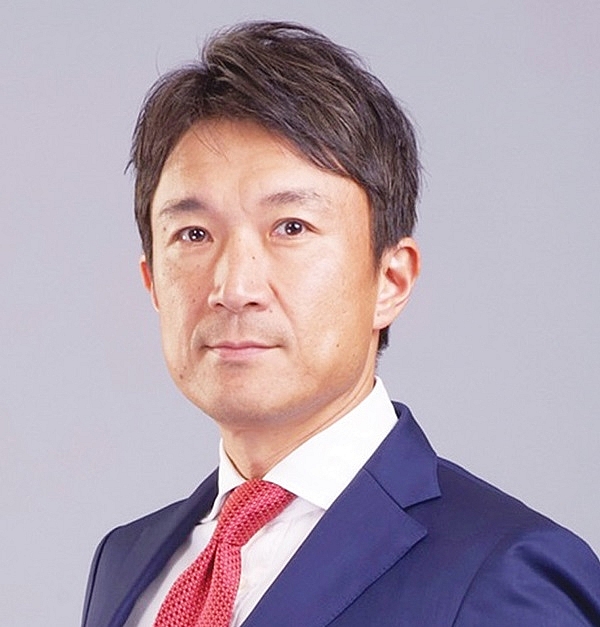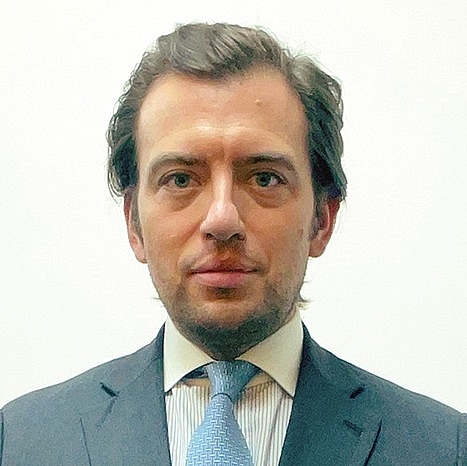Restoring confidence after a challenging year
 |
| Nicolas Audier, chairman of the European Chamber of Commerce in Vietnam |
The European Chamber of Commerce in Vietnam’s (EuroCham) members have appreciated the government’s swift and effective handling of COVID-19. This pandemic has hit markets and enterprises around the world, including in Vietnam. However, its impact here has been mitigated thanks to the proactive efforts of the government to protect both lives and livelihoods.
These actions have helped companies to weather the storm of COVID-19 and now open for business which would be much more difficult in lots of other economies around the world that continue to struggle with the virus.
Back in the first quarter of 2020, when COVID-19 first started to spread around the world, EuroCham asked its members about their perceptions of its impact in our Business Climate Index (BCI). The BCI is a regular barometer of EuroCham members and their perceptions of the trade and investment environment. Each quarter, it tracks the performance of EuroCham’s member companies and their perceptions of the economic outlook in Vietnam.
In that period, three-quarters of European business leaders saw their costs increase as a result of COVID-19, while two-thirds saw their orders fall and 60 per cent had lost revenue. However, fast-forward to the third quarter and – thanks to the government’s response – the confidence of business leaders is returning.
Our members are now reporting a sense of cautious optimism about the future, with the total BCI score rising from 27 points in the first quarter to 57.5 in the third quarter. Business leaders were more positive about their own enterprise in the third quarter, with 40 per cent describing their performance as either “excellent” or “good” – more than double the 18 per cent recorded in the previous three-month period.
The fourth quarter looks to be even more promising, with 44 per cent predicting a strong end to 2020. Meanwhile, most companies are anticipating stabilisation in their headcount (65 per cent) and investment plans (57 per cent), with just under half (44 per cent) expecting to see an increase in their revenue and orders.
During the COVID-19 period, our members have benefited from the support of the government both in terms of policies which enabled European companies to continue operating wherever it was safe to do so, and in terms of tax changes.
For instance, more than a quarter of companies benefited from the delay in tax payments and land rental in the second quarter, with almost 20 per cent benefiting from a temporary suspension of their social insurance contributions.
New business models
European companies continue to prioritise an open and competitive business climate, a modern legal framework, and a market based on free, fair, and rules-based trade. The year has brought significant challenges to companies here and around the world, but it has also re-emphasised that these principles are the building blocks of sustainable economic growth and development – as Vietnam has shown over the last few decades.
Therefore, the focus of European companies is on embracing the opportunities for trade and investment in the post-pandemic world. In particular, with the EU-Vietnam Free Trade Agreement (EVFTA) now in force, this agreement can be considered a roadmap to recovery since falling tariffs and growing market access will help to boost trade when it is needed most.
Vietnam has made huge strides in accelerating digital transformation in recent times. The use of digital procedures has helped to modernise and streamline administrative processes and, in turn, free up both time and costs for business. This was reflected in the 2019 World Economic Forum’s Global Competitiveness Index, which ranked Vietnam as the most-improved nation out of all 141 countries included in the report.
Europe contains some of the world’s leading digital companies, and EuroCham members are active in the fields of digital infrastructure, ICT solutions, and smart cities, to name just a few. Our members are proud to share their knowledge of these and other digital industries with their partners in Vietnam, both to help the domestic sector grow and to ensure that the next generation have the skills to thrive in the new era of the Fourth Industrial Revolution.
However, in order to be able to tap into this trend even further, European companies would encourage the government to continue its successful programme of digital transformation.
To take just one example, ensuring a consistent application of electronic signatures would help to streamline business procedures and encourage the digitalisation of different sectors and industries. This is more important than ever during COVID-19 where companies need to minimise the amount of human interaction in their business operations.
Towards a new year
COVID-19 is under control in Vietnam, but much of the rest of the world continues to struggle with the impact of the crisis. However, even with light at the end of the tunnel in the form of vaccine approval and roll out – including Vietnam’s own vaccine which is being trialled – the pandemic will cast a cloud over global trade for much of 2021. In this situation, it is essential that companies take full advantage of opportunities for trade and investment wherever these arise.
In this respect, Vietnam will be an even more attractive trade and investment destination for European companies. Firstly, because the business environment is much more open than elsewhere around the world, thanks to the government’s handling of COVID-19. But, on top of this, European companies now have privileged access to the Vietnamese market, thanks to recent implementation of the EVFTA.
The moment it entered into force, this historic trade deal eliminated 65 per cent of tariffs on EU exports to Vietnam and 71 per cent of tariffs on Vietnamese exports to the EU. This will rise to almost 99 per cent over the next decade, meaning that European goods will soon be able to compete on equal terms with those from countries with which Vietnam has an FTA in place such as South Korea, China, and Japan.
Meanwhile, the EVFTA will also open up new markets to European investment and innovation. Vietnam will be one of the few countries to post strong economic growth in 2021, so these opportunities will be even more attractive to EU enterprises keen to increase their trade and investment in a world still suffering from COVID-19.
For instance, Vietnam has agreed to liberalise cross-border higher education services, environmental services, maritime transport, telecommunications, and financial services, among others. These sectors will provide a greater incentive for EU investors to increase their footprint in Vietnam and increase the flow of foreign direct investment into 2021 and throughout the next decade.
| Nguyen Thi Thu Hang - Sales director, 379 Urban Development and Construction Co., Ltd.
The company’s project under construction during the past two years has been seriously affected by events this year. We even had to think about halting progress altogether. Fortunately, with the efforts of leaders and workers on site, we still handed over the works to customers as committed, keeping their trust. In mid-December, we held the topping-out ceremony of the Athena Complex Phap Van project in Phap Van-Tu Hiep area in Hanoi, marking an important milestone in the process of completing the project. It is expected that by the fourth quarter of 2021, we will hand over the entire project and ancillary works to customers as committed by the company. Although the real estate sector cannot avoid difficulties and impacts due to the pandemic continuing in 2021, we will continue to implement the principle of developing more green buildings, focusing on improving project quantity, and handing over on schedule as committed to customers. That is the key for the company to increase strength and gain customer trust. Patricia Marques - General director, Starbucks Vietnam
By the end of 2020, we opened just five new stores, fewer than planned. When the pandemic broke out our business was severely affected, especially in major tourist destinations like Hanoi and the central city of Danang. However, we still worked with our delivery partners to maintain our business. Now and GrabFood, Starbucks’ two largest delivery partners, continued to push their business, helping our business avoid further troubles. After the worst of the outbreaks were contained in August, most Starbucks stores in Vietnam showed signs of rapid recovery. Up to the time of Christmas, Starbucks in Vietnam is still showing signs of a very positive recovery, and even exceeding our expectations. In 2021, we will continue to revise our business plan, including temporarily halting plans to open new stores to preserve capital and stabilise operations of the current 67 Starbucks stores. Nirukt Sapru - CEO in Vietnam, ASEAN, and South Asia Cluster Markets Standard Chartered Bank
Vietnam has achieved dual targets of suppressing COVID-19 and maintaining economic stability thanks to the Vietnamese government’s bold and timely moves. This not only shows enhanced resilience of the country in weathering the global economic volatility in recent years, but it also reaffirms Vietnam’s position as one of the fastest-growing economies in ASEAN. The government and the State Bank of Vietnam (SBV) remain prudent and consistent in regulating monetary policies to stabilise the macro-economy, control inflation, and provide timely support for the business community and citizens. With such strong measures, the Vietnamese economy has maintained growth momentum with GDP growth rate estimated at 2.6 per cent in 2020, which is a success in the context of pandemic with many economies facing negative growth. For the banking sector, the government still considered banking operations as substantial for the economy and society. Some prominent policies from the SBV include issuance of Circular No.01/2020/TT-NHNN in March to assist pandemic-affected borrowers, and Official Letter No.5596 from August on key banking tasks in second half of the year. In addition, the SBV cut key interest rates three times since March in order to support liquidity and help credit institutions access lower cost of funds. Interest caps for VND deposits of less than six months and for short-term lending have also been cut three times during the same period. Credit institutions are meanwhile encouraged to reduce operating costs in order to have rooms for further reducing lending rates. David Salt - COO, LOGIVAN Technologies
As a transportation technology company, we serve customers across many industries. This puts us in a position where we experience the changes that COVID-19 has caused across sectors. And whilst some sectors such as construction, furniture, and textiles have been hit hard by COVID-19, many others have remained strong throughout the year. In response to the pandemic we took measures to increase our liquidity and cash reserve. We have continued our services throughout the year, supporting supplies to reach where they are needed and businesses to recover. As a doctor by profession, I was delighted to see the response of the government to COVID-19. The response was clear, disciplined, strong, and evidence led. And while it caused a negative impact in the short term, it has allowed Vietnam to get back to almost normal life for the majority of the year – something most other countries can only dream of. Currently the export market is rebounding substantially, but it is facing some technical barriers. Since the middle of the year, there has been lower container availability and less space on vessels, causing higher prices for container shipping and containerised road transportation. I expect that this problem will be mostly resolved through the first half of 2021, presenting a great opportunity for exporting companies to re-establish a fast and affordable route to foreign markets. As transportation supply increases, we will reflect this on to our customers who will benefit from lower prices, shorter lead times, and increased booking flexibility. I look forward to travel resuming between Vietnam and other countries. This could begin by selectively permitting travel with other countries that have effectively controlled COVID-19, or by allowing passengers certified with vaccination to travel. The latter would certainly allow COVID-19 to return, but accompanied by a test on return and limited quarantine period, I believe it is a viable solution to increase ease of movement while still managing the risk. Takeshi Masuyama - Managing director, Head, MUFG Bank, Ltd. Hanoi Branch
Like many companies the world over, we had to quickly and decisively react and adapt to the rapidly-changing conditions. The focus was to ensure the safety of our staff while activating business continuity plans so that we can maintain operations and continue to support our clients with minimal disruption. We also had to immediately embrace new ways of doing things, such as streamlining work processes and communicating with clients through virtual forums and online discussions. Most importantly, we continue to help our clients leverage our unrivalled Asia-Pacific network for growth. Our strategic partnerships with some of the region’s leading banks, such as VietinBank, have paved the way for collaborative synergies that are still being put to good use in support of our clients. COVID-19 has also further reminded us of our social mission to contribute to the sustainable growth of the local economy and society. On a global level, we have accelerated lending and commitment lines and undertaken corporate social responsibility efforts such as providing grants for medical research and donating funds to Vietnamese students studying in Japan who may be hit hard by the pandemic. Ywert Visser - International sales manager, Paul Mueller Company
When pandemic travel restrictions started in March, our company quickly responded by implementing online tools so that we could continue meeting and working with our customers. It has worked better than expected but is not a perfect replacement: face to face meetings are still most effective. Meanwhile, in our factory we applied all prevention measures that are mandated by the government, and now most colleagues work from home. Going forward, we focus on what we can control, and we have increased efforts to develop our business in Vietnam. I also spend more time engaging in activities to support the businesses around me here. Within our company we also have adjusted our priorities, for example enhancing sales tools and training materials for customers. In 2021 we will continue on this path, working as best as possible within the limitations that exist. In terms of policy support, in particular for attracting foreign investment, I recommend the government continues with the activities implemented in 2020 to enhance business investment conditions, such as e-government initiatives. Federico Vasoli - Managing partner, dMTV Global
In 2020, adaption was key and obviously many industries and people have tried to readjust to the pandemic circumstances. Business-wise we have not fared too badly and that is not through just luck, but the result of a carefully planned strategy to operate internationally and to focus on niches such as asset protection, digital tokens, and global trade. Some clients in the digital industry have outperformed their wildest growth dreams and we are honoured to have contributed to their success. Similarly, those that chose Vietnam as a manufacturing base are happy with their choice. Recently-signed free trade agreements between the EU and Singapore and Vietnam respectively, as well as the significance of the Regional Comprehensive Economic Partnership, testify once more that ASEAN is poised to grow. For sure there will be obstacles and, sadly, more personal tragedies linked to this pandemic, but at least here governments and people have managed to cope far better than elsewhere, addressing the importance of digitalisation and trade, which by definition can survive without a physical presence of people and, more importantly, contribute to defusing some geopolitical tensions. Aleksandrs Parfjonovs - Head of Vietnam Operations, Grindeks JSC
Our head office in Latvia, the largest pharmaceutical company in the Baltic states, has so far had only a few COVID-19 cases. With regards to our Hanoi-based office, we have been working as usual, limiting our international trips and travelling only domestically. Our main challenge currently is to have the logistics and production steady so we can bring high-quality medicines to the patients worldwide, including our main market in Southeast Asia – Vietnam. I think Vietnam has done a great job with preventing outbreaks. It also saw the signing of the EU-Vietnam Free Trade Agreement, which opens many opportunities for businesses in and outside of Vietnam. Challenges to focus on now would involve the complicated laws, especially in such sophisticated industries as pharmaceuticals, which create barriers to entry. Nevertheless, the Vietnamese government is improving its efforts and I hope it will keep to that positive trajectory over the new year. |
What the stars mean:
★ Poor ★ ★ Promising ★★★ Good ★★★★ Very good ★★★★★ Exceptional
Related Contents
Latest News
More News
- NAB Innovation Centre underscores Vietnam’s appeal for tech investment (January 30, 2026 | 11:16)
- Vietnam moves towards market-based fuel management with E10 rollout (January 30, 2026 | 11:10)
- Vietnam startup funding enters a period of capital reset (January 30, 2026 | 11:06)
- Vietnam strengthens public debt management with World Bank and IMF (January 30, 2026 | 11:00)
- PM inspects APEC 2027 project progress in An Giang province (January 29, 2026 | 09:00)
- Vietnam among the world’s top 15 trading nations (January 28, 2026 | 17:12)
- Vietnam accelerates preparations for arbitration centre linked to new financial hub (January 28, 2026 | 17:09)
- Vietnam's IPO market on recovery trajectory (January 28, 2026 | 17:04)
- Digital economy takes centre stage in Vietnam’s new growth model (January 28, 2026 | 11:43)
- EU Council president to visit Vietnam amid partnership upgrade (January 28, 2026 | 11:00)









 Tag:
Tag:


















 Mobile Version
Mobile Version